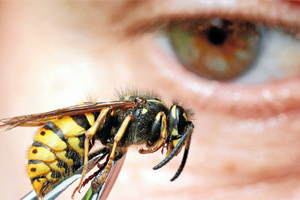Bid for more cash to tackle wasp problem
Entomologists are trying to drum up increased funding to fight a huge wasp problem.
Entomologists are trying to drum up increased funding to fight a huge wasp problem.
Warm and dry weather stretching back well over a year, and the rapid spread of giant willow aphids which produce honeydew - a favourite wasp food - is behind the spread.
Wasps have hit the headlines after people discovered monster nests near their homes, or after the insects launched aggressive attacks including including one on primary school children and adults stung when a nest was disturbed at Tahunanui Beach.

Professor Phil Lester from Victoria University's School of Biological Sciences said the rapid spread of the willow aphids, which had arrived in this country in the past few years, had made the wasp problem worse.
"These aphids are effectively fuelling the wasps.
"They're [wasps] really aggressive. They're probably the most harmful animal we have in New Zealand."
At Victoria, research looking at potential biological control using pathogens and parasites was at an early stage.
"Many New Zealanders, including us entomologists, are pretty desperate for a wasp control option. So there's all sorts of avenues being investigated," Phil says.
For now, there were baits that could be used to kill wasps but a lack of registration of effective pesticides for wasp control limited their use.
"My desire would be to work towards something that was environmentally sustainable, like a biological control agent, whether that's something in New Zealand that we could exploit, or something that we need to bring in from overseas," Phil says.
Two invasive species of social wasps are the major problem in New Zealand. German wasps, which have spread to most of the North Island and parts of the upper South Island, and common wasps which almost completely displaced german wasps from beech forests in the upper South Island because of their superior competitiveness.
The Department of Conservation said wasp densities in South Island's 1 million hectares of honeydew beech forests were the highest recorded anywhere on Earth at around 34 nests per hectare.
Dr Darren Ward of Landcare Research said higher wasp numbers affected the breeding success of some birds and also had an impact on some lizard and bug populations.
A group had been set up to lobby central government about the problem, while a study funded by DOC and the Ministry for Primary Industries was trying to put a figure on the economic cost of wasps, Darren says. "Wasps don't just affect native habitats. They have quite a big health impact. They kill many, many thousands of beehives each year. They're also in vineyards and orchards. They will eat grapes and spoil fruit."
It had been estimated wasp abundance in the forests would need to be reduced by more than 80 per cent to conserve vulnerable invertebrate species.
- © Fairfax NZ News
